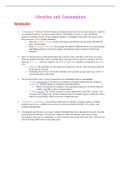Lifestyles and Consumption
Introduction
• Consumption = formal or informal contract accompanying processes of payment (processes related to
an exchange of money or reciprocal expectations). Consumption involves a series of different
processes: choosing, buying, using, repairing a product, or managing waste. But it also goes beyond
these processes, as it’s socially embedded.
o From an economic viewpoint, braces, hard drugs and vibrators are just goods with different
prices and functions.
o From a sociological viewpoint, those goods are related to different forms of use and meaning,
with different degrees of social acceptance and different forms of markets (formal and
informal).
• How we consume does not only depend upon the concrete society and time in which we are living
(think of smoking → polite to offer cigarettes back in the day, but nowadays not anymore), but also
upon our preferences which are related to our lifestyles and tastes, and those are related to our social
class.
o Lifestyle = the particular way that a person or group lives and the values and ideas supported
by that person or group.
o Combining these factors with further variables such as gender and age opens up a variety of
research questions in this field.
• Over the last twenty years, we have experienced two remarkable trends in consumption.
o 1st trend: digitalization. Consumers are accorded increasingly hybrid functions, leading to
prosumption (interrelatedness of production and consumption).
▪ Binary constructions of consumers versus producers/labourers are all too often too
simple, especially in times of digital markets.
o 2nd trend: greening. The ‘circular economy’ concept replaces the ‘end of life’ concept. Also,
consumers in the digital age are better informed and can multiply negative information about
brands on social media, which sets up new competition rules.
• Collaborative consumption = an economic model based on sharing, swapping, trading, or renting
products and services, enabling access instead of ownership (think of Airbnb, GO scooters, and
stichting thuisgekookt).
• Consumption and lifestyles are not just isolated individual behaviours, but patterns that arise from the
social groups one belongs to, the physical settings in which one operates, and society at large.
Consumption processes are embedded in a web of socially constructed wants and needs, which are not
driven by human DNA but by leaned behaviour.
, Consumption, lifestyles, and taste
• What people ‘are’ (culture) and ‘do’ (spending behaviour) can no longer be conceptualized by a simple
one-to-one relation. Instead, the concept of lifestyle can provide a link between social rank and social
practice. Lifestyles signify an individual’s personal expression, as well as social solidarity through
collective consumption patterns.
• Modern lifestyles lead to complicated human forms of communication. The distinctions can be seen as a
growing multiplicity of cultural styles.
o Dissociation of social circles | substitution of traditional social life rhythms with more complex
forms | increasing rate of social change.
• Status groups have a specific type of lifestyle that revolves around the principle of the consumption of
goods.
• Dualism is one of the driving forces of development, bringing about change.
o Society is dualistic: “universality and particularity”, “continuity and change”
o Human beings are dualistic: humans are part of a uniform collectivism as well as
representatives of specific individual accentuations.
Society is the result of interdependencies, in which everything is related to every other thing. Each
(un)intentional interaction between two actors can be seen as society.
Human knowledge and cognition in society are highly dependent upon the evolution of the money
economy.
• Fashion is a product of social and psychological factors, which is displayed in fashion’s dualism of
imitation (adoption by a social group which demands mutual imitation from its members) and
distinction (expressing individual personality and creating self-image).
• Fashion forces people to position themselves. Being a fashion hero or noob both means being different
from others.
• In the past, people focused on durability and stability, but nowadays, the focus is on luxury. New
commodities are consumed within a very short time while older commodities would still work.
o This is not voluntary, but it’s due to social pressure. Every fashion trend forces a majority of
people to unify their needs and thus compels individuals to change their needs earlier than they
would consider necessary.
o As soon as the lower classes begin to copy the fashion style of the upper classes, the upper
classes adopt a new style, and this goes on and on.
• There are three types of patterns that can change fashion trends:
o External events, internal mechanisms, and historical developments
• Taste is a principle of classification, since consumption reflects a social order.
o Goods/services have a significance that goes beyond utilitarian and commercial value:
▪ Social significance through carrying and communicating cultural meaning
▪ Symbols of class status (context and culture specific)
• Habitus = milieu with collective (un)consciousness, which bounds a set of attitudes, beliefs,
and behaviours which belong to a group of people.
• Social stratification = categorization based on demographic features such as age, education, ethnicity
and gender. It prevents individuals from being characterized based on ‘what they are’ (e.g. what they do
professionally) and can be directly equated to how they behave.
o Closed stratification / caste system: social position is determined at birth.
o Open stratification / class system: social position (class) is based on personal achievements
and social factors
• Social inequality = when people frequently receive more of a society’s valuable goods than others,
owning to their position in the social network of relationships. Illegitimate/unjust → inequity.




